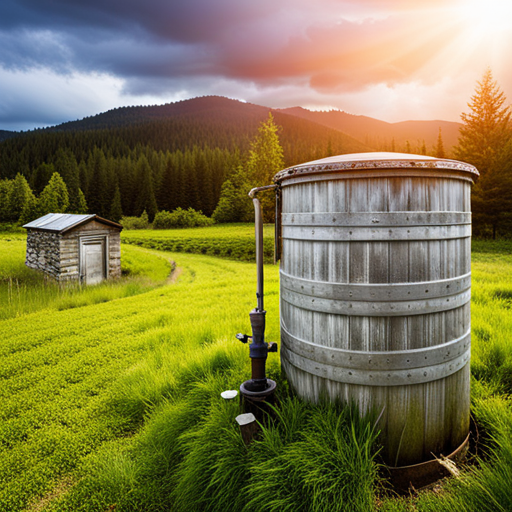Are you looking for a sustainable way to conserve water and reduce your water bills? Look no further than cisterns! These water storage solutions are an excellent investment for your home or garden, providing a reliable source of water for years to come.
Cisterns come in various sizes, materials, and types, and can be equipped with filtration systems to remove contaminants and improve water quality. With proper maintenance, cisterns can last up to 20 years or more, making them a long-term solution for your water needs.
In this article, we’ll explore everything you need to know about cisterns, including their lifespan, materials, and maintenance, to help you make an informed decision about this water solution for decades to come.
Key Takeaways
– Cisterns are a sustainable and reliable way to conserve water and reduce water bills.
– There are various types of cisterns made of different materials and sizes.
– Proper maintenance and inspection are crucial for a long-lasting water storage system.
– While the cost may vary, cisterns can be a wise investment for your home or garden, with savings on water bills and government incentives offsetting the cost.
What are Cisterns?
If you’re looking for a way to store water in your home or garden, cisterns are a great option that can last up to 20 years or more depending on the material and maintenance.
Cisterns are containers used to store water, and they come in various types and materials. They can be above-ground or below-ground, made of concrete, fiberglass, or plastic. Cisterns can be equipped with filtration systems to remove contaminants and used to store potable water for emergency purposes. They can help conserve water, improve water quality, save money on water bills, and be used for irrigation.
There are several advantages to using cisterns. For one, they provide a reliable and convenient source of water for various uses. Additionally, they can help reduce the impact of droughts and water shortages, especially in areas facing these challenges.
Cisterns can also help reduce the amount of stormwater runoff and pollution by capturing rainwater and storing it for later use. Depending on the size, type, and additional features, the cost of cisterns can vary, but the savings on water bills and government incentives in areas facing water shortages can offset the cost.
Lifespan and Maintenance
To ensure a long-lasting water storage system, regularly maintaining and inspecting the cistern is crucial. Your cistern’s lifespan depends on the material it’s made of, the climate it’s exposed to, and the level of maintenance it receives.
Generally, a well-maintained cistern made of concrete or metal can last up to 20 years or more. On the other hand, cisterns made of plastic may not last as long. As such, it’s important to choose a cistern made of durable materials and keep up with regular maintenance to ensure it lasts as long as possible.
To maintain your cistern, it’s important to keep it clean, especially if it’s being used to store potable water. Additionally, inspecting the cistern for any cracks or leaks and repairing them immediately can help prolong its lifespan. Installing a protective cover or shade over the cistern can also protect it from harsh weather conditions and prevent it from being exposed to extreme temperatures.
Lastly, monitoring the water level in the cistern and ensuring it’s always filled with clean, fresh water can help keep it in good condition for years to come. By following these maintenance tips and comparing materials before purchasing, you can ensure your cistern provides a reliable water source for decades.
Cost and Incentives
When considering purchasing a cistern, you can offset the cost by taking advantage of government incentives and saving money on water bills in areas facing water shortages. Many government programs offer rebates or tax credits for cistern installation, making it more affordable for homeowners.
Additionally, cisterns can save you money in the long run by reducing your water bills and providing a reliable source of water for irrigation or emergency purposes.
The installation process for a cistern can vary depending on the size, type, and location of the tank. It may require excavation or construction work, which can add to the overall cost. However, many cisterns are designed to be easy to install and can be done by a professional or DIY enthusiast.
It’s important to consult with a professional and follow all local regulations and permits when installing a cistern to ensure safety and compliance.
Conclusion
So, now that you know all about cisterns, you may be wondering if they’re the right water solution for you. If you live in an area with limited water resources, want to reduce your water bills, or need a reliable source of water in case of emergencies, cisterns may be the perfect solution for you.
They’re durable, long-lasting, and can be customized to fit your specific needs. But keep in mind that cisterns require regular maintenance and upkeep to ensure their longevity and effectiveness. You may need to invest in additional features, such as filtration systems or pumps, depending on your usage and water quality.
However, the benefits of having a cistern, including improved water quality and conservation, make it a worthwhile investment in the long run. So, if you’re ready to save money and conserve water, consider installing a cistern today!
